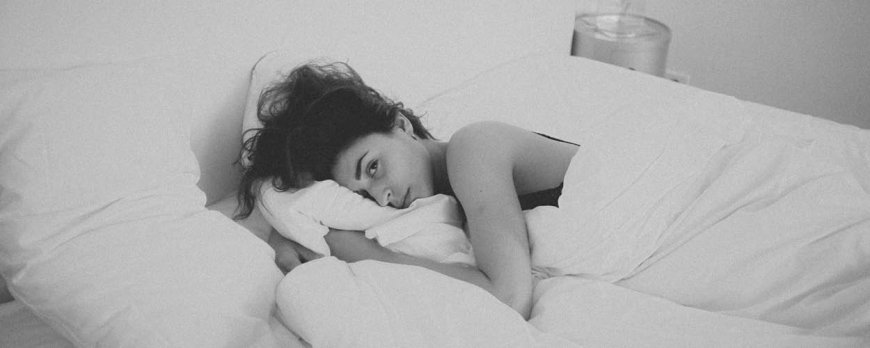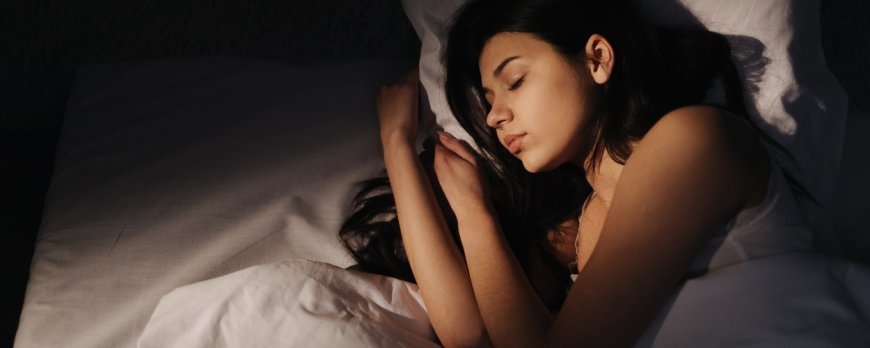Can dehydration affect your sleep?
Can dehydration affect your sleep? Explore the intriguing correlation, its implications, and how staying hydrated can enhance your nightly rest.

Can Dehydration Affect Your Sleep?
Dehydration can have a significant impact on your sleep, leading to various sleep disturbances and a decline in sleep quality. When you're dehydrated, you may feel tired, lethargic, and fatigued, which can make it harder to sleep well. Dehydration can also cause symptoms like headaches, dry mouth and nasal passages, and muscle cramps, all of which can disrupt sleep. On the other hand, too much fluid intake can lead to frequent urination at night, interrupting sleep. Lack of sleep may also contribute to dehydration, as a study found that people who slept only six hours per night had higher rates of dehydration than those who slept eight hours. Sleep deprivation can interfere with the body's hormonal signals for water retention. To improve sleep and hydration, it's important to find the right balance of fluid intake, maintain hydration throughout the day, limit fluid consumption before bed, and create a comfortable sleep environment.
Key Takeaways:
- Dehydration can cause tiredness, lethargy, and fatigue, making it harder to sleep well.
- Symptoms of dehydration, such as headaches and muscle cramps, can disrupt sleep.
- Excessive fluid intake can lead to frequent urination at night, interrupting sleep.
- People who sleep less may have higher rates of dehydration.
- Sleep deprivation can interfere with the body's hormonal signals for water retention.
- Finding the right balance of fluid intake and maintaining hydration throughout the day are important for good sleep.
- Limiting fluid consumption before bed and creating a comfortable sleep environment can also promote better sleep and hydration.
The Relationship Between Hydration and Sleep

Understanding the intricate relationship between hydration and sleep is crucial in comprehending how dehydration affects our nightly rest. When our bodies are dehydrated, we may experience feelings of tiredness, lethargy, and fatigue, making it harder to achieve a restful sleep. Dehydration can manifest in various symptoms, including headaches, dry mouth and nasal passages, and muscle cramps, all of which can disrupt our sleep patterns.
Conversely, excessive fluid intake can result in frequent urination at night, causing interruptions in our sleep. It is also worth noting that lack of proper sleep may contribute to dehydration. A study has revealed that individuals who sleep for only six hours per night have higher rates of dehydration compared to those who enjoy a full eight hours of sleep. Sleep deprivation can interfere with the body's hormonal signals for water retention, further compounding the impact of dehydration on our sleep quality.
Strategies for Improving Sleep and Hydration
- Finding the right balance of fluid intake is key. It is important to hydrate throughout the day, maintaining a consistent intake of water to prevent dehydration without overloading the system.
- Avoiding excessive fluid consumption before bed is advisable to minimize disturbances from nighttime urination. It is recommended to limit fluids a few hours before sleep.
- Maintaining a comfortable sleep environment can aid in achieving better sleep and hydration. Factors such as ideal room temperature, minimal noise, suitable lighting, and comfortable bedding can contribute to a conducive sleep environment.
By understanding the interplay between hydration and sleep, and implementing strategies to maintain proper hydration levels, we can improve our sleep quality and overall well-being.
Effects of Dehydration on Sleep Quality
Dehydration can significantly impact sleep quality by causing symptoms that interfere with a restful night's sleep. When you're dehydrated, you may experience fatigue, making it harder to fall asleep and stay asleep throughout the night. In addition, dehydration can lead to headaches, dry mouth and nasal passages, and muscle cramps, all of which can disrupt your sleep and leave you feeling restless.
On the other hand, excessive fluid intake right before bed can also disrupt your sleep. This is because it can lead to frequent urination during the night, causing you to wake up multiple times and interrupting your sleep patterns. Finding the right balance of fluid intake is crucial to maintain hydration without sacrificing your sleep quality.
The Importance of Hydration for Better Sleep
A study conducted on sleep and dehydration found that individuals who slept only six hours per night had higher rates of dehydration compared to those who slept eight hours. Sleep deprivation can interfere with the body's hormonal signals for water retention, making it more difficult for your body to stay properly hydrated. This highlights the importance of getting enough sleep to support hydration levels and overall well-being.
To improve sleep and hydration, it's essential to prioritize both throughout the day. Start by maintaining hydration throughout the day by drinking an adequate amount of water. Avoid excessive fluid intake close to bedtime to prevent frequent urination during the night. Creating a comfortable sleep environment with a cool temperature, minimal noise, and suitable bedding can also contribute to better sleep and hydration.
- Stay hydrated throughout the day by drinking an adequate amount of water
- Avoid excessive fluid intake close to bedtime to prevent frequent urination
- Create a comfortable sleep environment with a cool temperature, minimal noise, and suitable bedding
By prioritizing hydration and implementing healthy sleep habits, you can improve the quality of your sleep and enhance your overall well-being. Remember that proper hydration is not only crucial for staying hydrated throughout the day but also plays a significant role in promoting a restful and rejuvenating night's sleep.
The Role of Fluid Intake in Sleep Disturbances
Proper fluid intake plays a crucial role in avoiding sleep disturbances caused by dehydration. When our bodies lack adequate hydration, it can lead to various symptoms that interfere with sleep quality. Dehydration can leave us feeling tired, lethargic, and fatigued, making it harder to fall asleep and stay asleep throughout the night.
In addition to general fatigue, dehydration can cause specific symptoms that disrupt sleep. Headaches, dry mouth, and nasal passages can be common when we are dehydrated, making it uncomfortable to breathe and sleep peacefully. Muscle cramps can also occur due to dehydration, causing discomfort and restlessness during the night.
On the other hand, excessive fluid intake before bed can result in frequent urination during the night, disturbing the sleep cycle. It's essential to strike a balance between staying hydrated and limiting fluid consumption closer to bedtime to minimize disruptions. Finding the right balance of fluid intake throughout the day is key to maintaining proper hydration levels without sacrificing sleep quality.
Creating a comfortable sleep environment is equally important for promoting both hydration and quality sleep. Factors such as temperature, noise, lighting, and comfortable bedding can significantly impact our sleep. By ensuring that our sleep environment is conducive to relaxation and rest, we can enhance the overall sleep experience and support better hydration.
Sleep Deprivation and Dehydration

Sleep deprivation can contribute to dehydration, creating a cycle that further disrupts sleep quality. When you don't get enough sleep, your body's water balance can become imbalanced. Studies have shown that sleep loss can affect the body's hormonal signals for water retention, leading to increased fluid loss through urine and sweat. This can result in dehydration, which in turn can exacerbate sleep disturbances.
Dehydration's impact on sleep quality is significant. When you're dehydrated, you may experience symptoms like fatigue, headaches, and muscle cramps, all of which can make it difficult to fall asleep and stay asleep. Additionally, dehydration can cause dry mouth and nasal passages, leading to discomfort during sleep.
On the other hand, excessive fluid intake before bed can lead to frequent urination during the night, disrupting sleep. Finding the right balance of fluid intake throughout the day is essential to maintain proper hydration without compromising sleep quality. It's recommended to limit fluid consumption before bedtime to prevent disruptive bathroom trips during the night.
Practical Tips for Improving Sleep and Hydration:
- Drink an adequate amount of water throughout the day, following recommended guidelines for your age and weight.
- Avoid excessive fluid intake before bedtime to minimize disturbances from nighttime bathroom trips.
- Consider incorporating hydrating foods, such as fruits and vegetables with high water content, into your diet.
- Create a sleep-friendly environment by keeping your bedroom cool, dark, and quiet to promote restful sleep.
- Invest in a comfortable mattress, pillows, and bedding to enhance sleep quality.
- Establish a consistent sleep schedule and practice relaxation techniques to improve overall sleep hygiene.
By prioritizing both hydration and quality sleep, you can break the cycle of sleep deprivation and dehydration, leading to improved overall well-being and vitality.
Tips for Improving Sleep and Hydration
Implementing certain strategies can help enhance both sleep and hydration, promoting overall well-being. Here are some practical tips to improve your sleep and maintain proper hydration:
- Find the right balance of fluid intake: It's essential to stay hydrated throughout the day, but excessive fluid consumption close to bedtime can lead to frequent trips to the bathroom during the night. Aim to drink enough fluids during the day to meet your hydration needs, and taper off consumption in the hours leading up to bedtime.
- Maintain hydration throughout the day: To prevent dehydration, make sure to drink water or other hydrating beverages regularly throughout the day. Set reminders or carry a water bottle with you to ensure you're consistently sipping on fluids.
- Create a comfortable sleep environment: Your sleep environment plays a significant role in promoting quality sleep and hydration. Ensure your bedroom is cool, quiet, and dark, as these conditions are conducive to a good night's rest. Invest in a comfortable mattress and bedding that support optimal sleep comfort.
- Limit fluid consumption before bed: While staying hydrated is important, consuming large amounts of fluids right before bed can disrupt sleep due to frequent bathroom visits. Try to finish your evening fluids at least one to two hours before bedtime to minimize sleep interruptions.
By following these tips, you can create a healthy balance between sleep and hydration, ensuring that your body gets the rest and fluids it needs for optimal functioning.
Creating a Sleep-Friendly Environment
Creating a sleep-friendly environment is essential for optimizing hydration and promoting restful sleep. Here are some tips to help you create the perfect setting for a good night's rest:
- Keep your bedroom cool and well-ventilated. A temperature between 60-67 degrees Fahrenheit (15-19 degrees Celsius) is considered ideal for sleep.
- Reduce noise and light disturbances. Use earplugs or a white noise machine to mask any unwanted sounds, and invest in blackout curtains or an eye mask to block out excess light.
- Choose comfortable bedding. Make sure your mattress, pillows, and blankets are supportive and cozy, allowing you to fully relax and get the rest you need.
- Establish a calming bedtime routine. Engage in relaxing activities before bed, such as reading a book, taking a warm bath, or practicing meditation, to signal to your body that it's time to wind down.
In addition to creating a sleep-friendly environment, it's important to pay attention to your fluid intake throughout the day:
- Drink water regularly. Aim to consume at least 8 cups (64 ounces) of water per day, or more if you engage in physical activity or live in a hot climate.
- Avoid excessive fluid intake before bed. While it's crucial to stay hydrated, drinking large amounts of fluids right before bedtime can increase the likelihood of nocturnal trips to the bathroom, interrupting your sleep.
By implementing these tips and prioritizing both hydration and sleep, you can create an environment that supports optimal rest and overall well-being.
Hydration and Sleep in Different Age Groups
The relationship between hydration and sleep varies across different age groups, with specific considerations to ensure adequate rest and hydration. Here's a breakdown of how hydration and sleep patterns can differ among various age groups:
- Infants: Infants have higher water requirements compared to adults due to their rapid growth and development. Proper hydration is crucial for infants to maintain their body temperature and overall well-being, which directly impacts their sleep.
- Children and Teenagers: Children and teenagers need sufficient hydration for optimal cognitive function and growth. Sleep patterns can be affected by factors such as activity levels, academic stress, and environmental factors like temperature and air quality.
- Adults: For adults, hydration is essential for maintaining overall health and promoting quality sleep. Factors like lifestyle, diet, and medication use can influence hydration levels and subsequently impact sleep patterns.
- Older Adults: Older adults may experience changes in thirst perception, leading to a higher risk of dehydration. Adequate hydration is crucial for older adults to support sleep quality, cognitive function, and overall well-being.
In each age group, it's important to pay attention to individual hydration needs and make adjustments accordingly. Consulting with healthcare professionals can provide tailored advice based on specific circumstances and health conditions.
Creating a sleep-friendly environment, maintaining proper hydration throughout the day, and following healthy habits can contribute to better sleep quality across all age groups.
The Impact of Medications on Sleep and Hydration
Medications can have an impact on both sleep quality and hydration, necessitating attention and informed decision-making. Certain medications can cause dehydration as a side effect, leading to symptoms like dry mouth and nasal passages, which can disrupt sleep. Additionally, some medications may affect the regulation of hormones that influence sleep, potentially leading to sleep disturbances.
To manage the impact of medications on sleep and hydration, it is important to consult with a healthcare professional. They can provide guidance on potential side effects and offer strategies to minimize disruptions to both sleep and hydration. It may be necessary to adjust medication dosages or explore alternative treatment options to find a balance that optimizes sleep quality while maintaining adequate hydration.
When taking medications, it is crucial to be mindful of fluid intake. Some medications may require increased fluid consumption to counteract potential dehydration. However, excessive fluid intake close to bedtime can lead to frequent urination, impacting sleep quality. Therefore, it is recommended to consume fluids throughout the day and limit intake in the evening to avoid disruptions to sleep caused by nighttime bathroom visits.
Key considerations when it comes to medications, sleep, and hydration:
- Consult with a healthcare professional to understand the potential impact of medications on sleep and hydration.
- Be aware of the potential side effects of medications, such as dehydration, and take appropriate measures to maintain hydration levels.
- Follow recommended fluid intake guidelines, ensuring a balance between sufficient hydration and avoiding excessive fluid intake near bedtime.
- Create a sleep-friendly environment to support optimal sleep, including maintaining a comfortable temperature, reducing noise levels, and utilizing appropriate bedding.
In summary, medications can have an impact on sleep quality and hydration levels. It is important to be aware of potential side effects, consult with a healthcare professional, and implement strategies to maintain adequate hydration and optimize sleep. By prioritizing both sleep and hydration, individuals can promote overall well-being and improve their quality of life.

Conclusion
Dehydration can indeed affect your sleep, highlighting the importance of maintaining proper hydration to promote restful and rejuvenating sleep. When you're dehydrated, you may feel tired, lethargic, and fatigued, which can make it harder to sleep well. Headaches, dry mouth and nasal passages, and muscle cramps caused by dehydration can also disrupt your sleep quality.
On the other hand, excessive fluid intake can lead to frequent urination at night, interrupting your sleep. It's essential to strike a balance when it comes to fluid intake, ensuring you stay hydrated throughout the day without consuming excessive fluids before bedtime.
Additionally, lack of sleep can contribute to dehydration. In fact, a study found that people who slept only six hours per night had higher rates of dehydration than those who slept eight hours. Sleep deprivation can interfere with the body's hormonal signals for water retention, further emphasizing the importance of getting enough restful sleep.
To improve both your sleep and hydration, it's crucial to prioritize maintaining a proper balance of fluid intake throughout the day. Drink enough water to stay hydrated, but be mindful of your intake before bed to avoid disruptive nighttime trips to the bathroom. Creating a comfortable and sleep-friendly environment can also enhance the quality of your sleep. Consider factors such as temperature, noise, lighting, and comfortable bedding to promote a conducive sleep environment.
In conclusion, adequate hydration plays a significant role in ensuring optimal sleep quality. By understanding the impact of dehydration on sleep and implementing strategies to maintain proper hydration, you can improve the quality and duration of your sleep, leading to better overall well-being.
FAQ
Can dehydration affect your sleep?
Yes, dehydration can affect your sleep. When you're dehydrated, you may feel tired, lethargic, and fatigued, making it harder to sleep well.
What symptoms can dehydration cause that may disrupt sleep?
Dehydration can cause symptoms like headaches, dry mouth and nasal passages, and muscle cramps, all of which can disrupt sleep.
Can drinking too much fluid before bed interrupt sleep?
Yes, drinking too much fluid before bed can lead to frequent urination at night, interrupting sleep.
Is lack of sleep a contributing factor to dehydration?
Yes, lack of sleep may contribute to dehydration. A study found that people who slept only six hours per night had higher rates of dehydration than those who slept eight hours.
How does sleep deprivation interfere with hydration?
Sleep deprivation can interfere with the body's hormonal signals for water retention, leading to increased dehydration.
What can I do to improve sleep and hydration?
To improve sleep and hydration, it's important to find the right balance of fluid intake, maintain hydration throughout the day, limit fluid consumption before bed, and create a comfortable sleep environment.
How can I create a sleep-friendly environment?
Creating a sleep-friendly environment includes factors such as temperature, noise, lighting, and comfortable bedding that can contribute to better hydration and sleep.
Do hydration and sleep vary across different age groups?
Yes, hydration and sleep can vary across different age groups. Specific considerations for infants, children, teenagers, adults, and older adults should be taken into account regarding hydration and sleep.
Can medications impact sleep and hydration?
Yes, certain medications can cause dehydration as a side effect and affect sleep patterns.



























































































































